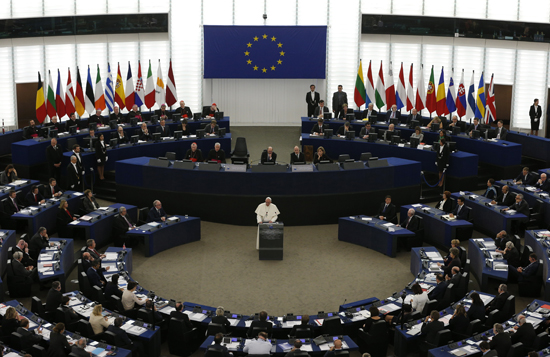There is a Catch-22 in the election which no one so far has noticed. As David Cameron and Ed Miliband square off, an electorate disenchanted with traditional politics seems to be yawning. Voters know that apart from excitements over how many Labour seats fall in Scotland and how many Lib Dem seats go in England and whether Ukip and the Greens make any kind of parliamentary breakthrough, the direction of the next government is not going to change radically.
Ed promises to regulate electricity prices, Dave says he will control the cost of rail traffic. Both parties will reduce the deficit, impose public sector cuts, keep nuclear weapons, invest in the police, back teachers, and support the NHS motherhood and apple pie. It is an election of small differences, save in one key area.
 The biggest single reason to vote either Conservative or Labour is Europe. Two years ago David Cameron seized one of the two core Ukip demands – namely that an In-Out or “Brexit” plebiscite on Britain staying in the EU should be held.
The biggest single reason to vote either Conservative or Labour is Europe. Two years ago David Cameron seized one of the two core Ukip demands – namely that an In-Out or “Brexit” plebiscite on Britain staying in the EU should be held.
So if you want a referendum that can lead to Britain exiting Europe, vote Tory. Labour and Ed Miliband, in contrast, have said a categorical “no” to organising an immediate Brexit referendum.
It is an open secret in Labour’s ruling circles that the decision to oppose a Brexit referendum was Ed Miliband’s. Senior shadow cabinet colleagues such as Ed Balls and Jon Cruddas and many Labour MPs wanted to match the Cameron offer of a referendum, thus neutralising it as an issue.
So on 7 May voters have a classic binary choice, where the two main parties are 100 per cent opposed to each other.
All EU ambassadors in London and most ruling politicians in Europe, irrespective of political affiliation, are horrified not just at the prospect of a referendum decision to quit the EU but at the idea that instead of focusing on jobs and growth and solving the Greek crisis, Europe would be gripped by Brexit negotiation for the next two years.
But foreigners have no vote in a British election and any intervention would be counter-productive.
There is complacency in the pro-European camp that it is inconceivable that Britain would vote to leave Europe. But as I argue in my recent book, this may be a colossal error. Most Tory MPs, all of Ukip, and quite a few Labour MPs, dislike Europe. The off-shore owned press is not going to convert to the pro-European cause. The toxic issue of immigration has now fused with membership of the EU. Many business leaders and financial commentators argue that Europe is an economic failure and the Euro a disaster.
If we isolate ourselves from Europe, we fundamentally alter our place in the world, as foreign firms will pause before investing in a UK outside Europe and the United States will no longer see Britain as a geo-political partner. Given the enormity of the decision to open the door to a Brexit, one might have thought this would be quite an issue in the election.
But the opposite is the case. Other than a powerful speech by Tony Blair there has been hardly any discussion on the implications of voting “yes” or “no” in a referendum.
The Eurosceptic press, which covers most mass circulation papers, is looking forward to a Brexit referendum which hands power from parliament to press proprietors and others with the financial resources to unleash populist propaganda against Europe.
So the centrality of the choice for or against holding a plebiscite is being downplayed by the media. Tory MPs in favour of Brexit told me they would not raise the issue because their sole aim, as with Ukip, is to obtain a referendum with David Cameron’s return to Downing Street.
Editors and television producers say they will wait until they know if there is to be a referendum before discussing the pros and cons of Brexit. This is the ultimate Catch-22. The most important divide between the two main parties cannot be discussed until the election is over – by which time it will be too late.
Denis MacShane is the UK’s former Minister for Europe under Tony Blair. His book Brexit : How Britain Will Leave Europe is published by IB Tauris
Above: When Pope Francis addressed the Council of Europe and the EU Parliament in November he urged Europe to rediscover “the best of itself”. Photo: CNS


 Loading ...
Loading ...
What do you think?
You can post as a subscriber user ...
User comments (2)
Denis, thank you for this perceptive blog.
I continue to recall my time at St Benedict's College Colchester when you visited us as Minister for Europe at the time of the expansion of the EU. We had flags of all the countries on display and representatives of all the new states. You really enthused our students.
One amusing aspect of your visit was the advance party prepIng for your visit. one young man asked me to explain the significance of St Benedict and Europe. He did not know that St Benedict is the patron saint of Europe. I remember him telling you about St Benedict and you telling him that you are a past student of St Benedict's in Ealing and as it happened knew more about St Benedict than the rest of us.
Keep up the good work.
The problem is David Cameron is not trusted, and with good historic reason. There are many instances where he has said one thing and then done the opposite, or said one thing and then said the opposite.